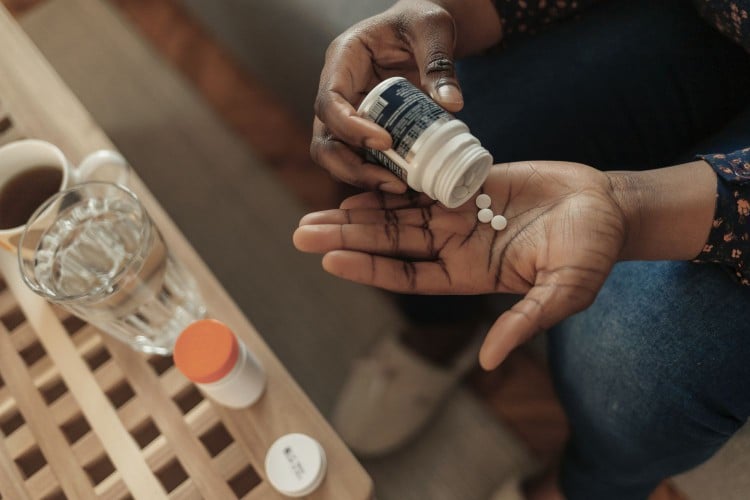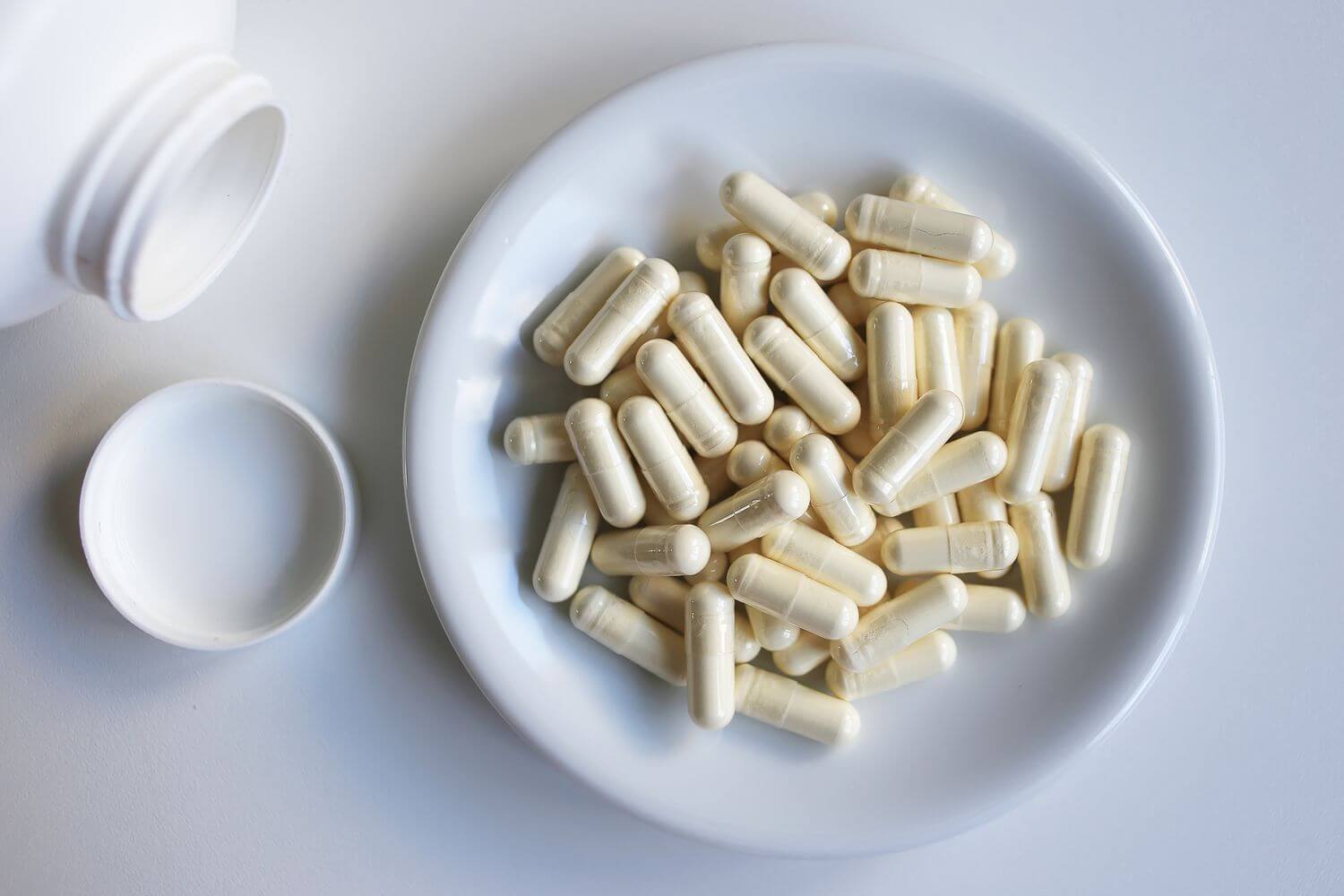- A new study found only 65% of Americans who've had a stroke or heart attack are taking low-dose aspirin to prevent a second one.
- Some experts believe prevalent aspirin misuse is caused by people not knowing if they should take the medication.
- While aspirin use can be risky for people who've never had a heart attack or stroke, it's crucial for those that have.

PixelsEffect/Getty Images
In recent years, studies have identified potential risks associated with taking daily aspirin, causing people to reconsider whether they should be taking the medication.
Though low-dose aspirin has for years been used as an effective tool to prevent strokes and heart attacks, research has shown that it could increase the risk of brain bleeds and anemia in those who are taking it to prevent a first stroke or heart attack. For that group, daily use aspirin guidelines and recommendations have changed within the last couple years as a result.
However, daily aspirin is still considered essential for people who’ve already had a stroke or heart attack, experts said.
Research suggests some level of confusion about who should and shouldn’t be taking daily aspirin—a 2020 study found that millions are taking aspirin unnecessarily, putting themselves at risk of bleeding. And new research published on August 22 found that only 65% of Americans who’ve had a heart attack or stroke are taking aspirin to prevent another, even though that number should be closer to 100%.
“The simple message is that if you have had a heart attack, stroke, stent, [or coronary] bypass surgery, [then] low-dose aspirin is really important to help prevent further events,” said James Udelson, MD, chief of the division of cardiology at Tufts Medical Center.
But for those who haven’t had one of these events, Udelson told Health, “the risks outweigh the benefits.”
Here’s what experts had to say about who should be taking a daily aspirin, and how each individual can weigh potential risks against the medication’s benefits.
When Can Aspirin Be Dangerous?
Aspirin is an antiplatelet medication, and has a host of uses—people might take it to get rid of headaches, pain, swelling, or fever. But it can also have more substantial effects when taken consistently.
“Platelets, they’re in our blood and they help blood to clot. And so there are times when you want that,” Anne Curtis, MD, SUNY distinguished professor of medicine at the University at Buffalo Jacobs School of Medicine, told Health. “If you have a cut or an injury or something, then the fact that platelets will clump together and help stop bleeding is a good thing.”
But if a person has plaque in their blood vessels, those platelets can stick to that plaque and cause blood clots. If those clots form in the blood vessels that supply blood to the heart or brain, it can lead to a heart attack or stroke, Curtis added.
Taking aspirin stops those platelets from causing clots in the first place.
Platelets also like to stick to stents—mesh tubes that hold arteries or airways open—or other foreign bodies, added Carlin S. Long, MD, professor of medicine and director of the Center for Prevention of Heart and Vascular Disease at the University of California, San Francisco. As a result, anyone with a foreign body should take daily aspirin as well.
But aspirin’s ability to stop platelets from clotting also opens the door to some unintended consequences. Because of the way that it affects the blood, aspirin can cause stomach bleeding, brain bleeding, and kidney failure in the most serious cases. In older adults, it may also raise risk of anemia, a condition that can cause weakness or exhaustion.
How Is Heart Disease Treated?
Health History Informs Aspirin’s Safety
To weigh aspirin’s benefits and risks, researchers have drawn a line between those taking the medication for primary prevention—meaning they’ve never had a heart attack or a stroke—and those taking it for secondary prevention, meaning they’ve already had an event and are trying to prevent a second one, Long explained.
The difference comes down to a person’s risk. People who have already had a stroke or heart attack—especially those who are older—are at a much higher risk of having a second one. Because of this, the risks of bleeding and other issues don’t outweigh the risk of yet another stroke or heart attack.
“For secondary prevention, meaning [you’ve] had one of these events, it’s abundantly clear that aspirin should be used to help prevent that next event,” Long told Health. “And nobody will argue with that. That is ironclad in the literature.”
But for the average person—those who are looking for primary prevention for a stroke or heart attack—aspirin’s cons generally outweigh its pros, experts agreed.
There are some exceptions, of course.
If someone has a high risk of a heart attack or stroke—if they have high blood pressure or high cholesterol, for example—and they aren’t able to take another type of medication that lowers that risk, they may take aspirin as a primary prevention, Long said. The same is true for people who have a high coronary artery calcium score, or a lot of plaque in their heart, he said.
But that decision should be made with a doctor and on a case-by-case basis.
Weight-Loss Drug Wegovy Could Reduce Risk of Heart Attack, Stroke
Making the Message on Aspirin Clearer
Aspirin has been used in people who’ve had a cardiovascular event for four or five decades, Udelson said, but “the real evolution has been in our understanding of [aspirin] for just pure prevention.”
A series of articles published in 2018 were the first to undermine the idea that aspirin shouldn’t be used as a general preventative medication, Long said. These studies found that aspirin benefits did not outweigh risks for people who’ve never had a heart attack or stroke.
As of 2022, the U.S. Preventive Services Task Force recommends that adults aged 40 to 59 years with a 10% or greater 10-year cardiovascular disease risk can decide to use aspirin, though the choice should be “an individual one.” It does not recommend that anyone over age 60 take aspirin for primary prevention.
However, a 2020 study estimated that nearly 29 million people—10 million of whom are aged 70 and older—take a daily low-dose aspirin even though they shouldn’t be.
Guidelines haven’t changed for people who have already had a heart attack or stroke—they should be taking a daily aspirin if their doctor recommends it.
But here too, researchers are also seeing aspirin use issues. According to the newest study published in JAMA, just 65% of Americans who have had a stroke or heart attack are taking aspirin. That number was about 40% worldwide, and less than a quarter in lower income countries, Sang Gune Yoo, MD, study author and cardiovascular disease fellow at the Washington University School of Medicine in St. Louis, told Health in an email.
It’s challenging to say definitively why this is happening, Yoo said, though it’s likely a “multifactorial” issue.
For one, people who are prescribed aspirin after a cardiovascular event may not realize that they have to take it for years as a preventative, Udelson said, or they may stop taking it because it causes discomfort.
Issues with access or other countries’ prescription rules could in part explain the disparities in aspirin use between high- and low-income countries.
Another reason for the disconnect could simply be what appears to be mixed messaging as guidelines change.
“Part of the confusion is that the public doesn’t understand the medical terminology between primary prevention and secondary prevention,” Long said. “And that’s critical in terms of the aspirin recommendations.”
It’s understandable that people want to prevent a stroke or heart attack, and they may not be up to speed on its risks. Even though statins are a much safer way to prevent a cardiovascular event, Long explained, people may not want to take them, or may not know to bring it up with a doctor.
On the other hand, people who’ve had a prior cardiovascular event may not be taking aspirin because they’re not sure if they should, or they may simply forget.
Whatever the reasons are, aspirin is cheap and effective, and there should be no reason that numbers are lagging in those who may benefit from it—Yoo and his team’s findings are a sign that “we need to urgently re-evaluate strategies to promote aspirin use,” he said.
“It’s a big public health concern when we have simple, cheap therapies that are actually really effective and millions of people aren’t taking them,” said Udelson.
17 Harmful Habits for Your Heart—And What To Do to Break Them








